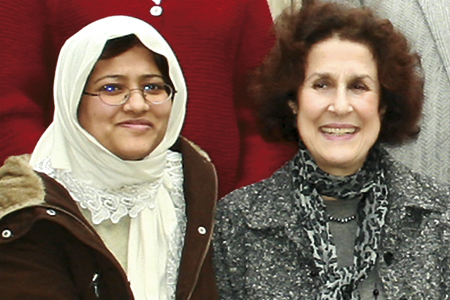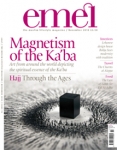
Beyond Faith
Issue 74 November 2010
Studying Islam, Judaism and Muslim-Jewish Relations, Eva, a secular Jew and Samia, a Muslim, talk about how they took a liking to one another, despite their differences.
Samia
Eva and I first met each other at a course at the Woolf Institute in Cambridge called Studies in Islam, Judaism and Muslim-Jewish Relations.
During the first break, I was eager to meet my new colleagues. I was particularly excited by the diversity of faith and cultural backgrounds. The very first person I chanced upon was Eva. Her arm was encased in a cast and what started off as a polite wish for a speedy recovery, ended up sparking a long and animated conversation. Her friendly manner and porcelain features instantly set me at ease.
I found Eva’s breadth of knowledge and her passionate contributions to discussions particularly inspiring. It resonated with my understanding of Islam; the search for knowledge is so greatly encouraged that the Prophet has said, “Seek knowledge even if it is found in China.” Our concurrent desires to learn and understand was something I felt could strongly bind us.
Eva was always full of rich ideas, exuding clarity and openness; because of this, I felt comfortable approaching our discussions of Jewish history and scripture with my own insights. With time, our theological discussions paved the way for more personal conversations. We began to talk about our own lives and personal religious experiences. We developed a strong foundation of understanding and respect, thus allowing us to disagree on issues of contention without damaging our friendship.
Eva and I are similar both in terms of what interests us, as well as the types of people we are. We both have strong interests in history and politics – subjects which we discuss on a regular basis. We’re both proactive individuals and passionately dedicated to the tasks we commit ourselves to.
What makes our friendship so strong is that even though we come from different faiths, particularly faiths that are seen to be embroiled in conflict politically, we are able to look beyond these differences and support each other in mutual projects. For example, Eva and I are currently working on an interfaith community project. Despite having conflicting ideas and approaches at times, we’re always able to come up with compromising solutions by finding common ground.
Eva
My first impression of Samia was based on the eloquence with which she spoke in classes and the pleasantness of her manner. We used to converse frequently in our breaks and gradually got to know each other better. At the end of our course, the students were encouraged to create and deliver a project with someone from a different faith. Samia and I agreed to join forces and talk about our beliefs to school-aged students, in addition to Muslim and Jewish organisations.
One thing Samia and I are both interested in is the origins of the Israeli-Palestinian conflict, and while I condemn some of what Israel does, I cannot condemn its existence. One of my sets of grandparents died violently in the Holocaust and had it not been for the acceptance of Jews into what was Palestine at the time, my other grandparents would have suffered the same fate. While Samia disagrees with my take on the subject, we respect each other, and have agreed to engage in further research on the topic.
Initially, we tried to hide our diverging opinions, but soon realised there was no need to pretend; we could show people that despite the fact that we come from two faiths which are often immersed in political and social friction, we have more in common than that, and are friends because of it. One of the most important lessons I’ve learnt is if you set aside your differences, there are always commonalities to celebrate.
For example, Samia and I are both passionate about Middle Eastern history, theology and politics, and share fervour for debating. We’re both open-minded and interested in each other’s views and approach to religion. I was brought up in a secular household, with both my parents being atheists, and I myself am an agnostic, while Samia has always been a practicing Muslim. Despite the potentially different sources of our morality, we both have strong and similar moral codes. We both believe that all people are equal and that as human beings, we are interconnected with the rest of society.
Samia is an amazing individual. She has been able to create a delicate balance to manage everything in her life that is important to her. In addition to working and being a devoted mother, she is an extremely kind-hearted and intelligent individual. I really do respect her.
Click here to read more of our Kith and Kin features
Bookmark this |
|
Add to DIGG |
|
Add to del.icio.us |
|
Stumble this |
|
Share on Facebook |
|
Share this |
|
Send to a Friend |
|
Link to this |
|
Printer Friendly |
|
Print in plain text |
|


Comments
0 Comments